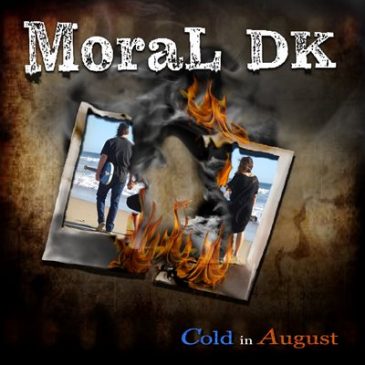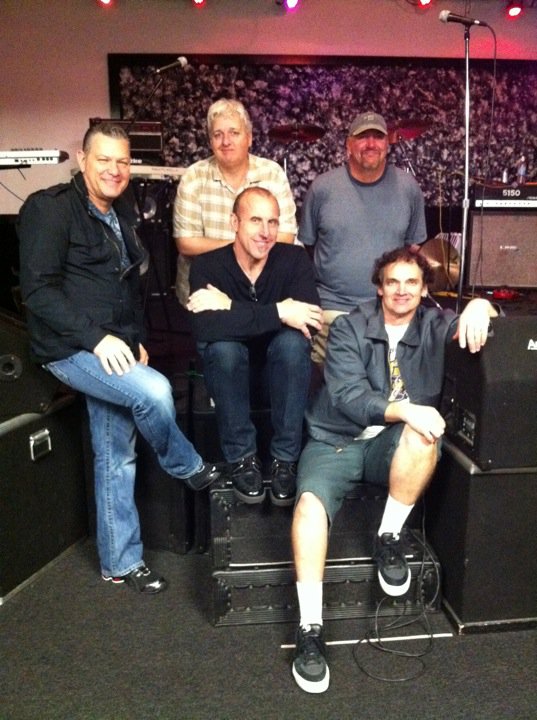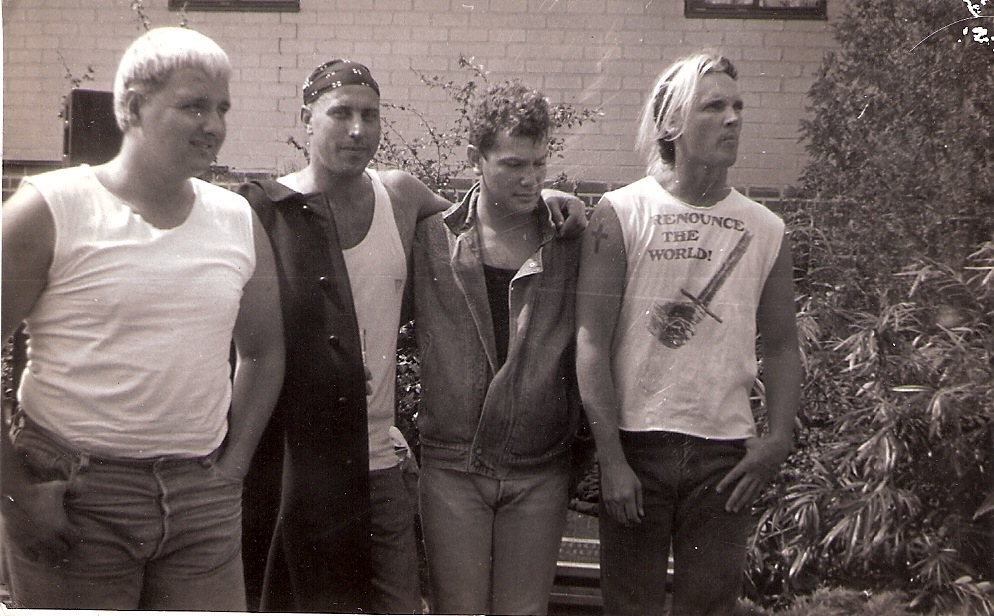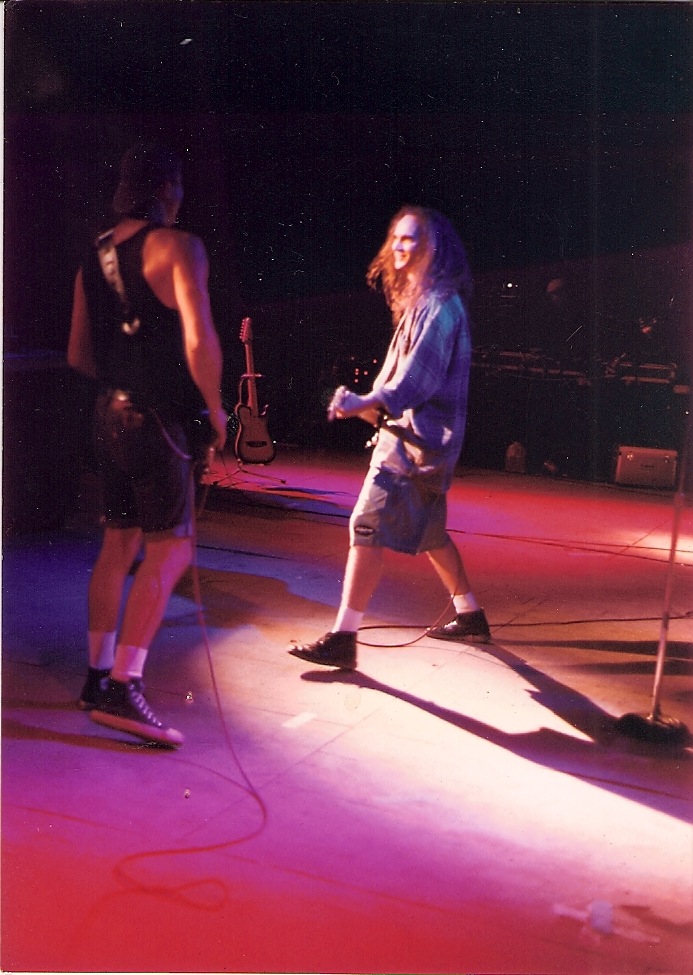Guitarist Gym Nicholson has had an extraordinary career as a guitarist, as a member of Steve Taylor’s backing group “Some Band,” recently as a member of Dead Artist Syndrome, and most prominently with the group he helped found, Undercover.
Still, with these bona fides intact, Nicholson is not immune to the emotional struggles that every one of us wrestles with. His latest project is now a band called Moral DK. It features members from Undercover and DAS, but unlike those groups, Nicholson is the primary lyrical voice of the group, albeit not the vocalist. The material that informed the band’s first album, Cold in August, emerged from the end of his marriage, the questions that arise from such a traumatic event, and the unsatisfactory search for answers or that ever-elusive “closure” people are so fond of talking about.

Moral DK is NOT the second coming of Undercover, even if it’s membership is largely comprised of it’s constituents. Bassist/keyboardist Ojo Taylor and Nicholson formed Undercover in 1982 and rode a wave of changes with the band right to 2002 and the band’s last record, I Rose Falling. These comprised raucous pop-punk, goth anthems, and blistering hard rock and groove rock. All these flavors wind up represented within Moral DK, but this new entity started as a personal expression that, somehow, became greater than it’s original intents and confines.
Nicholson graciously gave MusicTAP the time to discuss Cold in August, how Moral DK started as an emotional release and ended up a full-fledged band, and how the support of longtime brotherhood of music helps him get through it all.
MusicTAP: How did the new album and band come about?
Nicholson: Back in the second half of 2012, my wife unexpectedly decided she did not want to be married anymore after 22 years of a great relationship, and just left.
It was pretty devastating. Going through all of those emotions, I just started writing. One thing led to another. Joe (Undercover keyboardist/bassist Ojo Taylor) read some of what I was doing and said we had to do this album, if only to get it off my chest. It’s therapeutic to do something like that, so he and I started recording. It was only supposed to be me and him, but I thought we needed to bring in friends who understood where I’m at and know the situation.
It was a no-brainer to have (Undercover drummer) Gary Olson and (DAS bassist) Ric Alba come in since I’ve known them so many years and have worked with them, but know them more as family than anything else. Rob (Gallas, vocalist) was the same way, and I had to have Sim (Wilson) doing vocals as well. It started as them helping me to get over this, which is why it took so long, given this originated in 2012.
However, everything worked out so well that I just kept writing, so we turned this into a real band, and made it into a real thing. We have enough material for a whole second album, and we’re going to start that in the next month or two.

Clearly, this is something everyone can sympathize with. If not the breakup of a marriage, then certainly having a traumatic heartbreak that upends everything you know. Not everyone has the forum to express their feelings in public.
I felt compelled not only for my own sanity (to do this) but because I’m not the only person in this world that’s felt this way and has gone through this. Music like this can be so helpful in getting through such feelings. When my previous wife, Debbie, passed away in 1989, The Cure had just come out with the song “Pictures of You.” If you know the lyrics to that, you can imagine how it so totally spoke to me and helped me through the grieving of her death. This is kind of what I wanted to achieve with this material for Cold in August, to use the experience in a way that was relatable to someone else, and if I can help someone else through their heartache and heartbreak, that helps me as well.
You mentioned, though, that the album’s more diverse than that.
Yeah, every song has some kind of very personal message in there for me, but when you dig into them, not all of them are dealing with the breakup, of course.

What strikes me particularly is how Moral DK is comprised, and that these particular relationships have thrived for so long, even as the band Undercover has gone away and the individual members have experienced very different life and philosophy changes.
I attribute that to a few things. We really feel like we’re family to each other. We really love each other, and that’s God’s grace on all of this…that we can keep doing this, keep going, and count on each other wherever we’re at in our personal lives.
Both Rob and Sim sing on the album?
Yes, but there are reasons behind this. Rob sang most of the stuff, partly because we both are still in California, where Sim is in Tennessee. I had both Sim and Rob record everything, and when Joe and I were in the studio, I kind of listened to who performed the material in the way that was closest to how I felt when I wrote it. There are also circumstances involved because we’re going to take this live and keep the band going, meaning that Rob will consequently be much more involved, so it made sense that he would be the driver of those songs that formed our live set.
That said, I needed them both to be on the record. They are so much a part of my life, and I could not imagine doing this without them.
How was the record recorded?
We really were determined to do it the old school way, the way we used to. When I recorded the guitars for the DAS album Kissing Strangers, there was a lot of bouncing around and a lot of remote recording which was assembled toward the end.
But I needed to achieve that groove-feel for Moral DK, and that is dependent on everyone in the room really being “in the pocket,” so to achieve that, you all really need to be in the room, right? That meant that we really needed to play together.
We rehearsed the stuff for a while. We went to Northern Records in Yorba Linda (Calif.) and played together in the room – drums, bass, and rhythm guitar. Then we laid down some of the other guitar parts and keyboards. We did the vocals separately in overdubs, but the basics of every song were done in one big room. When Undercover did I Rose Falling in 2002, we didn’t do it this way. We did it more individually. You lose something doing it that way…at least that’s how it is for me, personally.

Things have changed since the inception of Cold in August, where it was, I suppose, a smaller record? As you mentioned, this was initially just you and Ojo, and now has become a full band with every intention to go out and play live. Given the very personal nature of some of the material, how are you approaching that?
It’s a little scary. You’re not sure if people are really going to understand the album when they listen to it. Are they really going to get it? I wrote those first songs not thinking there would be a band playing them live. I just wanted to get my feelings across and have it be – lyrically and musically – the best it could be. I wanted it so that when people heard it, if it wasn’t the type of music they’d typically listen to, they’d nonetheless appreciate the work, that it sounded good.
And there are so many ways to listen to music now that fragment the experience, right?
Yeah. I listen to a lot of music where I might not buy the whole album, or go see them live, but I can appreciate the quality and effort that’s been put into the work.
Now, I wouldn’t mind playing any of the songs we’ve done live, no matter how much some of them might hurt. If someone really latches onto a song that’s helped them through a tough time, I have no problem playing it. That said, now that we are a band and are functioning in that context, we’re picking and choosing what the live set will consist of. Plus, the material we’re readying to record for the second album has a much edgier sound to it. I don’t know if I’d say “punk” or “metal,” but those songs are definitely edgier.
But yes, it’s still a scary prospect to play some of this out, but in terms of doing so, I don’t really care what people think about that. I do care that we’ve presented the work as best as we possibly could and I think we achieved that, but in regard to the content, the message of the material…it’s a scary thing to put your feelings out there, but that’s not going to stop us from doing it.
Moral DK’s Cold in August is available now from CD Baby: https://store.cdbaby.com/cd/moraldk MusicTAP thanks Gym Nicholson for taking time to open up about the band and the personal experiences that guided its formation.
Lots of heart. somuch love